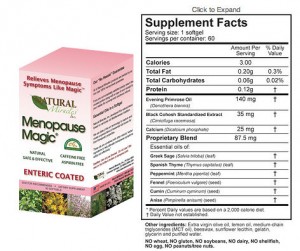Wednesday Bubble: Do you believe in magic?
If you believe in magic, come along with me…
-The Lovin Spoonful, 1965.
A lot has changed since the Lovin Spoonful released their Billboard Hot 100 hit ‘Do you believe in magic.’ And a lot has not changed. Just take a look around and you may see a 20 something year old hipster walking down the street in a fur vest, handlebar ‘stache and some rockin’ bottom bells, suede fringed bag, floppy ass hat or hotter than hot pants. And there are still miracles to be found in little white pills. Although today’s ‘little helper’ comes in the form of Menopause Magic.
Indeed, this ‘one size fits all’ tablet will cure all that ails, “relieve menopause symptoms just like magic!” Manufactured by Natural Miracles, Menopause Magic contains a natural blend of oils and herbs to relieve hot flashes, night sweats, backache, joint discomfort, low libido, vaginal dryness, forgetfulness, moodiness and abnormal menstrual periods. OMG! It MUST be magic! And, they even have laboratory studies to prove effectiveness!
Mind you, each pill contains black cohosh,which may help with those flashes, depending on the dosage and manufacturing practices. However, I have not seen much information on spanish thyme, greek sage or fennel or extra-virgin olive oil and menopause (truth be told, it has me thinking about my next meal!) But I digress.
Listen up ladies: there is no magic in menopause relief. It takes research, communication with a licensed, well-versed health practitioner and trial and error. Save your hard earned dollars on something other than these particular little white pills.
Sending love. In Spoonfuls.
Read More
Early menopause – is there a silver lining?
Early menopause (menopause before age 40) is often viewed as a kiss of death, especially among women who desire children (or more children) or rightly feel that it’s not yet ‘their time.’ More importantly, early menopause has been linked to a number of serious health conditions, including osteoporosis, heart disease and osteoporosis. But there is good news in the mix: it appears that early menopause may possibly reduce the risk of breast cancer in women under the age of 50. In fact, in a study aptly named the Two Sister Study, researchers compared 1,422 women with breast cancer who were diagnosed before age 50 and 1,669 case ‘sisters’who were free of breast cancer. The women were asked if they had experienced hot flashes, poor sleep, night sweats, irritability or depression and were asked specifically about the age when these symptoms first began. All participants were similar with regard to race, education, childbirth, breastfeeding experiences, cigarette smoking and alcohol intake.
Almost a third of the women who had menopausal symptoms before their they were either diagnosed with breast cancer or before their first interview. These women were likelier to have had a hysterectomy. And 30% who had hot flashes before the average age also reported that they had used hormone replacement therapy. Most importantly, however, women who had menopausal type symptoms before the age of 50 had half the odds of their peers of developing breast cancer, in particular, estrogen-positive breast cancer. This protection tended to decline the older that women became.
What do these findings mean? Undoubtedly it is important to consider factors that could influence the findings, such as age at first menopause or first birth, BMI, use of hormones, drinking and smoking. None of these variables appeared to affect the results. Second, self-reports are sometimes not entirely accurate yet the researchers accounted for this bias in their analysis.
So, today, I am reporting some quite good news. Early menopause can be devastating. But it may confer important protection against breast cancer and that is a very good thing!
Read MoreNewsFlash! Can fish oil supplements help prevent skin cancer?
Omega-3s. When it comes to a buzz, it keeps growing louder and louder. And while I’ve observed the buzz between a reduction in skin cancer risk and fish oils for some time now, the studies showing positive benefit have been done in rats, which makes it difficult to apply findings to humans. That is, until now.
Researchers from the University of Manchester in England published a paper in the American Journal of Clinical Nutrition online this past January that explored the first study of omega-3s and skin cancer in humans. And while the study is small, it’s a first step towards what could possibly be very good news for many .
For context, UV radiation (UVR) causes the majority of non-melanoma skin cancers and the incidence of these cancers continues to rise in particular, among white and lighter skinned individuals. Researchers believe that sunlight suppresses the ability of cells and the immune system to fight off skin cancer and infection, therefore allowing them to proliferate and cause cancer. This is one reason that people with diseases that suppress the immune system are more prone to developing cancer. However, there is some evidence that diets that are rich in omega-3 fatty acids are associated with reduced risk of skin cancer, perhaps as a result of how they benefit immunity.
The study included 73 women between the ages of 18 and 60 who sunburned easily with no or very little ability to tan. These volunteers either took 4 g of omega-3s daily (70% EPA, 10% DHA) or a placebo pill for 12 weeks and were exposed daily to 8, 15 or 30 minutes of simulated sunlight (via a special light machine). The results? Among women exposed to sunlight for 8 or 15 minutes a day, taking omega three supplements appeared to shut down immune suppression by as much as 50%. However the greater the sun exposure, the less effect omega-3s had, as the researchers did not observed the same protection among women who had 30 minutes of sun exposure daily .
The researchers say that the findings are important because most people apply sunscreen inadequately and don’t wear it daily. So, boosting daily omega-3 intake may potentially help protect against skin cancer, so long as sun exposure is limited. Still, bear in mind that omega-3s are not replacements for sunscreen; rather, consider them part of your armor against cancer. Meanwhile, we need bigger studies to see if these initial findings can be borne out in larger numbers of people.
Stay tuned. Whatever you do, omega-3s are good for your heart and perhaps, for you skin as well!
Read More








